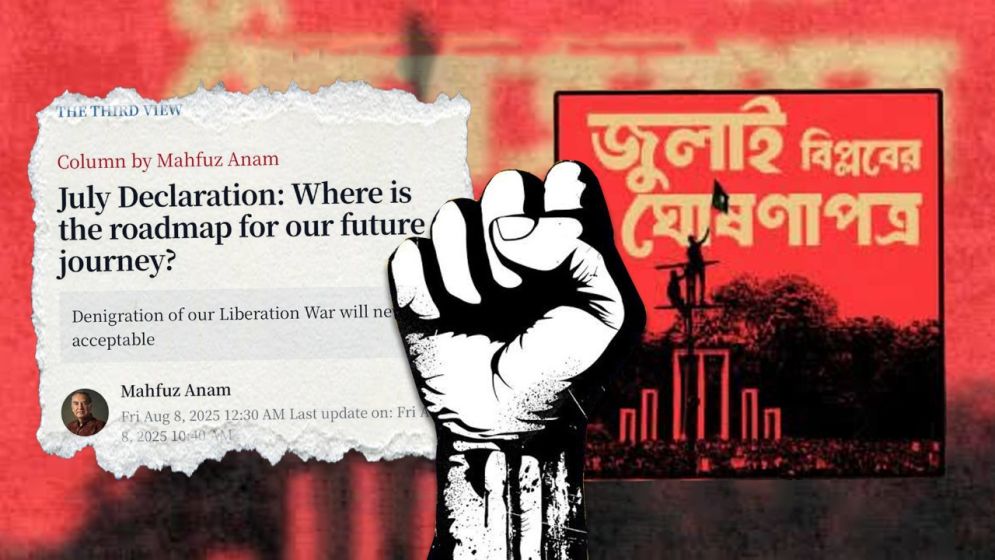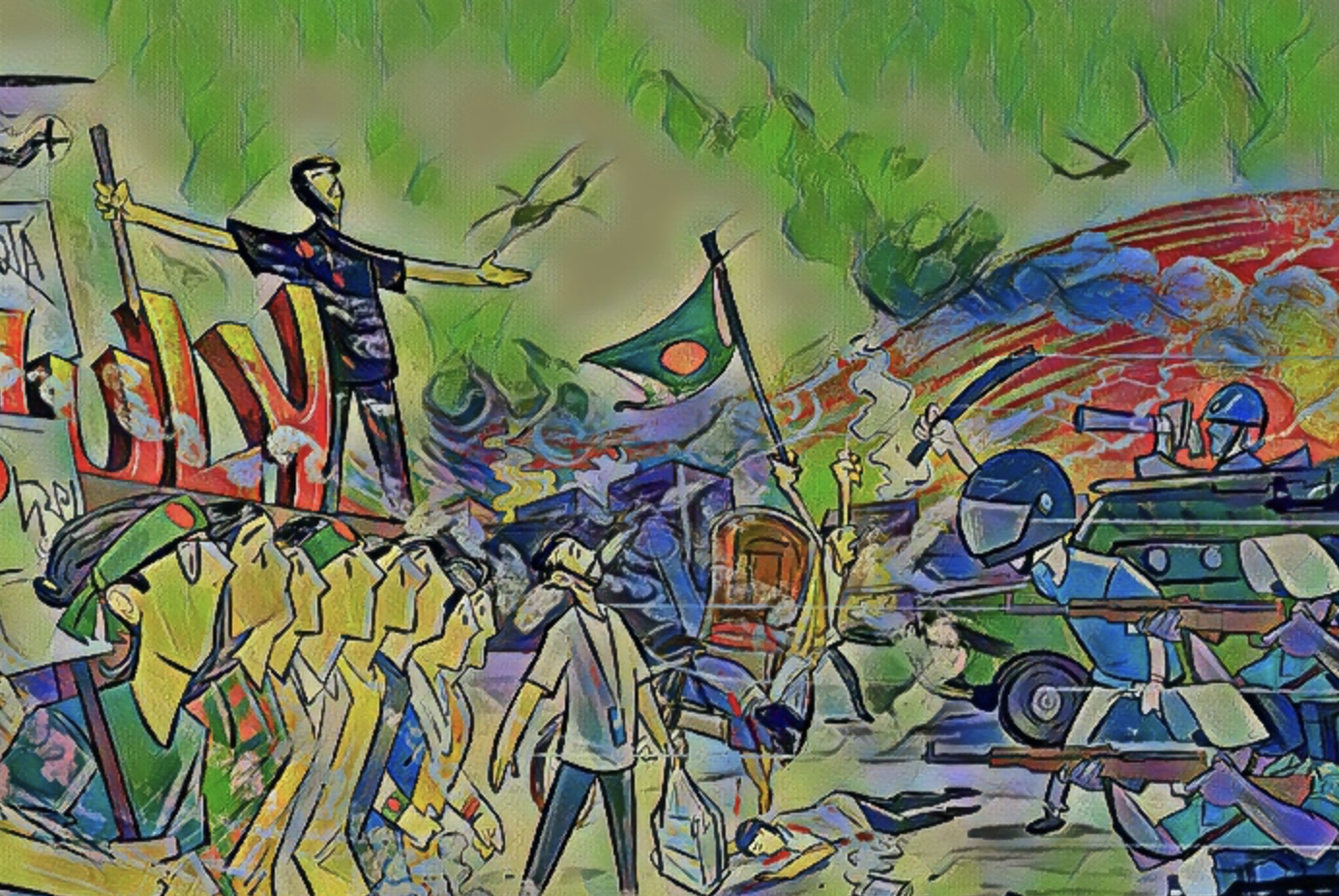The July Declaration meant to awaken, not to archive…and Mahfuz Anam misses that point

I read Mahfuz Anam’s recent op-ed criticising the July Declaration with a mix of interest and disquiet.
His words carry weight in Bangladesh’s political discourse, and understandably so, he has long been at the helm of The Daily Star, one of the country’s most influential newspapers. But this time, something didn’t sit right.
I have interacted with Mr. Anam a few times over the past 15 years, most notably during some of the most difficult periods in my family’s life.
When my father was detained without just cause and denied bail under Hasina's regime, Mr. Anam extended a few thoughtful words through his column. For that, I remain sincerely grateful.
However, over time, I’ve found myself grappling with the particular tone and positioning of Mr. Anam’s editorials. There is a careful calibration to his writing, one that often stops short of calling power to true account. Mahfuz Anam is a curious figure.
I’ve read his editorials–sometimes well-argued, occasionally brave–but more often than not, they tread cautiously, calibrated to appear critical without ever touching the core of authoritarian rot.
I read his recent column–especially his critiques of the July Declaration–I am left puzzled. I look for coherence, for a clear line of reasoning, but find instead a rhetorical maze.
One wonders: in the past 15 years, has he ever questioned Sheikh Hasina’s intent with the same intensity that he now reserves for the July declaration?
Perhaps it's the scientist in me, always searching for clarity and causality, but I cannot help noticing how his criticism, however articulate, often misses the point entirely.
Take his insistence that the July Declaration–the political manifesto that galvanized millions–should have included a detailed recounting of the Liberation War of 1971.
I think that argument is not only misguided; it is intellectually disingenuous.
We are not suffering from historical amnesia in Bangladesh. Our national memory is intact– robust, even. The events of 1952, 1971, and the defining chapters of our independence struggle are documented, archived, taught, and fiercely remembered. And the majority of our politicians and young people are the guardians of our 1971 legacy.
The problem isn’t forgetting. The problem is paralysis–a political system so calcified by fear and power-hoarding that no amount of history can resuscitate it.

Understanding the
nuances of July declaration
The July Declaration was never intended to be a history textbook. It was a political rupture–a response to a regime that ruled for 15 years by wrapping autocracy in the language of development.
A regime that rigged elections, criminalized dissent, and co-opted every institution it couldn’t crush. It weaponized the past to justify the brutality of the present.
So why did July happen?
Because 180 million people from across Bangladesh–with different faiths, ideologies, classes, genders and convictions–agreed on a single, inescapable truth: Sheikh Hasina’s rule must end.
That is the story. That is the urgency. And that is what the Declaration captured–not the past, but the demand for a future unshackled from fear.
History has already been written. The July Declaration is an attempt to write what comes next.
Yet Mahfuz Anam, ever the careful custodian of establishment respectability, chooses to dwell on what's absent from a historical footnote, rather than reckon with what is overwhelming in our lived reality.
His concern over omissions in the July Declaration’s summary of 1971 feels less like a defense of history and more like a distraction from the catastrophe we have just endured.
Let us not mince words: Sheikh Hasina did not merely govern–she ruled through repression. And when she finally fled, we were left to confront the smoldering ruins of a country hollowed out by authoritarian excess.
A crumbling economy. A banking system on life support, riddled with fraud, bad loans, and political interference. A generation of young people locked out of opportunity, their futures stolen before they could begin.
These are way more than any abstraction. These are facts

The burning memories
We have noted, with care and restraint, those who stood by–or worse, stood with–this regime. The enablers. The rationalizers. The selectively silent.
We remember the editorials that offered false equivalence between oppressor and oppressed. We remember the televised panels where intellectuals sanitized injustice in the name of stability.
We remember who chose comfort over courage.
So when Mr. Anam now warns that the July Declaration may "tarnish Bangladesh's image," we must ask a more urgent question: Are we so fragile a nation that truth becomes a threat?
The real stain on our international image was not the Declaration, but the regime that preceded it–a regime that sold authoritarianism as efficiency, and development as a substitute for rights.
Under Hasina, Bangladesh's name became synonymous with enforced disappearances, internet blackouts, jailed journalists, and elections that resembled theatre more than democracy.
Let’s be precise: development without democracy is not progress. It is control. And the July Declaration was, above all else, a mass rejection of that control–a declaration not only of political resistance, but of moral clarity.
It called not for a nostalgic retelling of 1971, but for the restoration of the very values that liberation once promised: dignity, justice, and a country that belongs to its people, not its rulers.
We were liberated in 1971, and we’ve carried the lessons of our history with us ever since. What we need now is the liberation of our voices, our institutions, and yes–our souls.
—
Shamaruh Mirza is an Australia based medical scientist with a deep passion for justice, dignity, and equality

